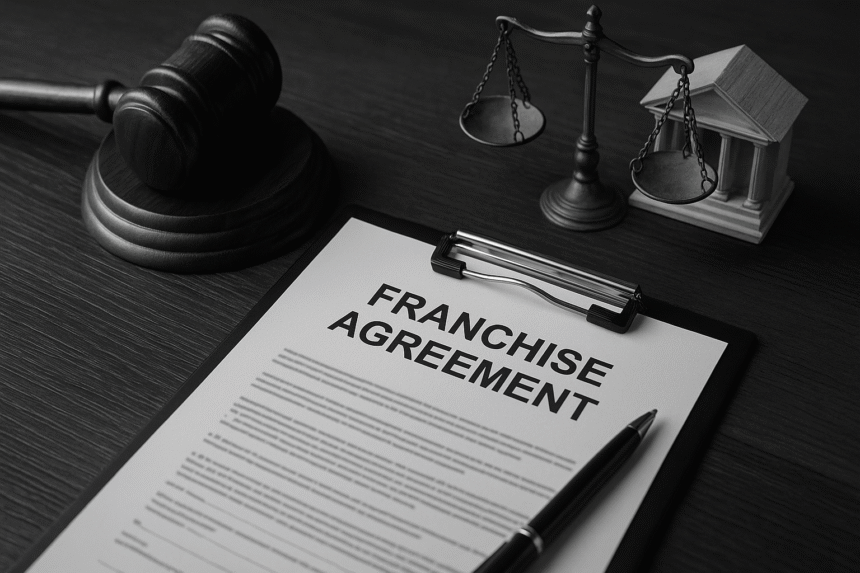10 Clauses You Must Include in Every Franchise Agreement
A weak franchise agreement can destroy a good brand. Whether you’re a franchisor expanding internationally or a local entrepreneur entering into a franchise deal, one thing is certain: your contract must do more than just look professional—it must protect both parties.
In this post, we’ll walk you through 10 must-have clauses that every franchise agreement should include. These are the legal building blocks that define rights, responsibilities, and remedies before conflicts arise.
Who This Is For / Why This List Matters
This list is for:
- Business owners looking to franchise their concept
- Lawyers or consultants drafting or reviewing franchise agreements
- Entrepreneurs about to buy a franchise
- Legal advisors helping clients expand regionally or globally
Use this when:
- You’re finalizing a franchise deal
- You’re reviewing an agreement before signing
- You want to protect your intellectual property, revenue, and brand reputation
1. Grant of Franchise Rights
This clause defines what exactly is being licensed:
- The use of brand name and logo
- Access to proprietary systems or software
- Territory (exclusive or non-exclusive)
Why it matters: It sets the boundaries of the relationship. Without it, the franchisee might assume broader rights than you intended.
2. Fees and Payment Terms
Clearly state:
- Initial franchise fee
- Ongoing royalties (flat or percentage)
- Marketing fees or software license charges
Best practice: Include timelines, payment methods, and consequences of late payments.
3. Franchisee Obligations
Spell out what the franchisee must do:
- Daily operations standards
- Staff training requirements
- Branding and signage guidelines
Tip: Include reference to the operations manual and require regular updates.
4. Franchisor Support
Outline what support the franchisor provides:
- Initial training
- Marketing assistance
- Technology or software support
This avoids disputes where franchisees claim they didn’t get what was promised.
5. Term and Renewal
Define:
- The initial contract period (e.g., 5 years)
- Conditions for renewal
- Fees or performance standards tied to renewal
Avoid this mistake: Letting a franchisee assume they can renew automatically.
6. Termination and Exit Options
List reasons the contract can end, such as:
- Breach of agreement
- Bankruptcy or insolvency
- Repeated quality violations
Also include:
- Notice periods
- Cure periods (time allowed to fix a breach)
- Post-termination obligations (e.g., removing signage, returning materials)
7. Intellectual Property Protection
Clarify who owns:
- The brand and trademarks
- Proprietary software, systems, or manuals
Important: Prevent the franchisee from using the IP after termination.
8. Non-Compete and Non-Solicitation
Restrict the franchisee from:
- Opening a competing business within a defined area or time frame
- Hiring staff or suppliers from the brand network
Tip: Make sure the restrictions are reasonable or they may not be enforceable.
9. Dispute Resolution
Include:
- Preferred jurisdiction and governing law
- Mediation or arbitration requirements
- Courts with exclusive authority
Legal note: If franchising across borders, choose a neutral venue that both parties can accept.
10. Force Majeure and Unexpected Events
This clause protects both parties if something outside their control happens:
- Natural disasters
- Political unrest
- Global pandemics
Include:
- What obligations are suspended
- Whether payments are paused
- How long before termination can occur due to force majeure
Mini Case Example: Preventing Brand Dilution in a GCC Expansion
A Middle Eastern coffee chain signed its first UAE franchise deal. The agreement didn’t include strict quality control or an IP clause. The franchisee changed packaging and introduced unauthorized menu items.
The franchisor couldn’t legally stop it without causing a dispute.
When renegotiating, they included clauses on IP usage, brand guidelines, and default consequences. The contract was enforced under UAE law with stricter protection, and future franchisees followed suit.
Quick Reference Checklist
Final Thoughts + Call-to-Action
Franchising can fuel massive growth, but only when the agreement is tight, clear, and fair. The right clauses act as your legal firewall—protecting your brand, revenue, and relationships.
Before you sign or offer any franchise deal, review these 10 essential clauses carefully—or better yet, book a legal consultation .



Leave a Reply